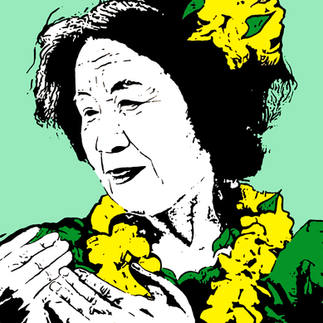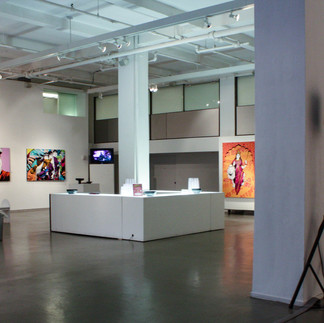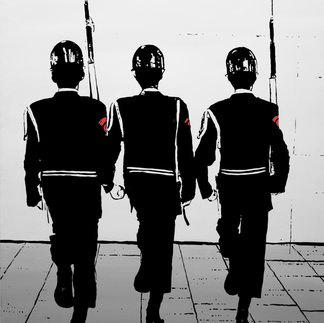Published February 4, 2025 at 7:00 AM CST
I recently had the pleasure of joining Charity Nebbe on Iowa Public Radio’s Talk of Iowa to discuss my debut memoir, How to Win a Million Dollars. In our conversation, we delved into the wildly inventive (and sometimes questionable) schemes from my youth, the journey of writing this coming-of-age story, and the unexpected paths that led me to where I am today. It was an honor to share my experiences and insights with Charity and her listeners. If you missed the live broadcast, you can listen to the full interview here:
NPR Talk of Iowa: How To Win a Million Dollars and BEEP Glitter
How to Win a Million Dollars and BEEP Glitter, the debut novel/memoir from Dubuque native artist and photographer Luke Stoffel, is a coming-of-age story that blends outrageous schemes, deeply personal moments and sharp cultural critiques in a journey through the 1980s and beyond.
Host Charity Nebbe talks with Stoffel, and later in the episode, the African American Historical & Cultural Museum in Waterloo was founded in 1996, but has largely been inoperable for several years. Ryan Madison and Tawanna Vint are two Iowans who are working to awaken and expand this institution, which plans to open for the season in late March.
Transcript:
Charity Nebbe: But first, Luke Stoffel has been dreaming big for as long as he can remember. Growing up in a blue-collar family in Dubuque, Iowa, he hatched multiple get-rich-quick schemes as a child. His dreams and schemes have carried him to New York City and around the world. He's a successful artist and photographer and has just published his first novel/memoir with a slightly censored title: How to Win a Million Dollars and BEEP Glitter!. He joins me today from Vietnam. Hi, Luke.
Lucas Stoffel: Hey! How are you, Charity?
Charity Nebbe: Good! Thanks so much for talking with me today.
Lucas Stoffel: Yeah, thanks for having me! It’s about midnight here in Vietnam, so...
Charity Nebbe: Wow! Well, thanks for staying up late for us. We’ll talk about what you're doing in Vietnam later, but I want to start in the 1980s in Dubuque, Iowa, with little Lucas dreaming big—exactly where your book begins. You were a kid who was very, very prone to get-rich-quick schemes. Can you tell me about the first time you decided you were going to win a million dollars?
Lucas Stoffel: Yeah, the story kind of starts in my childhood. I have vivid memories of going to the grocery store and seeing the Missing Cap’n Crunch contest on cereal boxes. If you found the missing Cap’n Crunch, you could win a million dollars! That was one of my first big schemes—trying to win big. It was the 1980s dream: succeed, strike it rich. As kids, we all wanted that.
Charity Nebbe: That’s such an American drive! We’re practically weaned on the idea that anyone can become a millionaire. But you grew up in a blue-collar family in Dubuque, Iowa, so this dream felt very personal to you. Can you tell me about your family?
Lucas Stoffel: Yeah, my dad was a factory worker at John Deere, and my mom was a stay-at-home mom until I was about seven, when she started working at Econo Foods. Later, she went back to college while I was in high school. It was a very "pull yourself up by your bootstraps" kind of family. Even as kids, we had jobs—we delivered the Telegraph Herald every day after school. That’s how we saved money for college. All of my siblings and I went to college with the money we made from paper routes. My parents really taught us the value of money.
Charity Nebbe: And your dad absolutely hated his job at John Deere, didn’t he?
Lucas Stoffel: Yeah, he worked in the foundry, which I describe in the book as a "fiery hellscape." It was brutal. He worked under these massive tractors in molten environments, doing backbreaking labor. But his job required 30 years of work to qualify for retirement and a pension. That was the dream—tough work, but with a solid payoff. By the time he was about my age now—47 or 48—he retired and never had to work again. That was incredible for him.
Charity Nebbe: Even though your parents worked hard, they insisted that college was non-negotiable for you and your siblings. Was that something openly discussed?
Lucas Stoffel: I don’t remember explicit sit-down conversations about it, but once my oldest sister, Heidi, went to college—she’s 12 years older than me—it became an expectation. It wasn’t "if" you were going to college; it was "where." We all ended up at Iowa State, University of Iowa, or UNI. It was just what you did after high school.
Charity Nebbe: You also grew up knowing that having five kids in a blue-collar household was a financial burden. That reality shaped a lot of your ambitions, didn’t it?
Lucas Stoffel: Yeah, absolutely. Five kids on one salary in the ‘80s—it was a lot. We lived in a small house, and while we were typical blue-collar, it always felt like we were on the edge of something. That’s where my drive to "win big" came from. I wanted more than what was on our alley in Dubuque. That drive fueled my early schemes—whether it was my paper route or my little Monopoly game scam.
Charity Nebbe: Ah, yes—the infamous McDonald's Monopoly game scheme! Everyone who got a Sunday newspaper received a game board and two pieces. What did you and your sister Jess do?
Lucas Stoffel: Well, I knew that most of my paper route customers were elderly and unlikely to use their Monopoly pieces. So, at about 9 or 10 years old, I hatched a plan. My younger sister, Jess, was about six or seven, and her route was at a nursing home—prime real estate for unused game pieces. We dug through those Sunday newspapers, grabbed every game piece we could, and stuffed them into our bags. We ended up with about 250 pieces!
Charity Nebbe: Did you win a million dollars?
Lucas Stoffel: No! Not even close. But we did win a ridiculous amount of free fries and ice cream. I remember treating all the neighborhood kids to McDonald’s that summer.
Charity Nebbe: That’s incredible! So, while you were always dreaming, you were also growing up as a Catholic kid in Dubuque, attending Catholic school. Pretty early on, you started feeling like you didn’t fit in. What was that experience like?
Lucas Stoffel: Yeah, I knew from a young age that I was different. But I didn’t know what was different. It wasn’t until junior high and high school, when kids started calling me gay and bullying me, that I started to understand. In a Catholic family, you carry a lot of guilt about being "different" before you even know why. That’s a big theme in the first three chapters of my book—navigating that confusion while dealing with bullying.
Charity Nebbe: Music was a refuge for you, right?
Lucas Stoffel: Absolutely. My older sister played piano, and music was always in our house. My dad still plays guitar five nights a week in the living room. I found my place in choir and musical theater in high school. I worked at the Grand Theatre during the summers, performed in Grease—that was my shining star moment!
Charity Nebbe: That’s fantastic! We’ll take a short break and listen to a little Roseanne Cash—one of your favorite artists growing up. When we come back, we’ll talk more about your journey from Iowa to Broadway, and eventually, the world. Stay with us!
We are back and I’m joined by Luke Stoffel, who has just published his first novel/memoir, How to Win a Million Dollars and BEEP Glitter!
Luke grew up in Dubuque, Iowa, always dreaming big from day one. Now, he’s a New York City-based artist and photographer who travels the world. Right now, he’s joining us from Vietnam.
Luke, before we move on, I want to talk about your early connection to music. It became a place where you felt you fit in, even while dealing with bullying at school. At the time, you didn’t fully understand that you were gay, but your classmates still teased you about it. We played a little of that Rosanne Cash song you learned to play on the guitar—something that brought you so much joy. But then, you experienced a terrible bullying incident. Can you tell us about that?
It’s hard to write about the most traumatic moments of your life, but when I was playing guitar, I had a teacher in the church rectory. Every Thursday, I’d go to lessons and leave my guitar outside her door.
One day, as I walked up, I noticed this awful stench in the hallway. I figured it was just the boys’ restroom. But when I opened my guitar case, I found that some kids had… defiled it. The smell was unbearable.
I slammed the case shut, ran home with the guitar strapped to my back, and scrubbed it as hard as I could with soap and water—probably ruining the wood in the process. But as a kid, going through something like that, what else could I do? I couldn’t tell my parents or my sister. How do you even begin to explain that?
I kept it inside for years. I didn’t tell my parents until I was in my 30s. You do learn and grow from these experiences, but man, it was tough. I write about that in the book because it was important to me to tell that story.
And that was the end of the guitar for you, right? Even though your family never knew why?
Yeah. I never really picked it up again. I did keep music in my life—I played piano in high school—but I never touched a guitar after that.
In high school, you were still dealing with bullying. And this was the early ’90s, a time when bullying wasn’t taken as seriously as it is today. There weren’t many places to turn for support, and at the same time, you still didn’t fully understand your own sexuality. When did you first realize you were gay?
Not until my freshman year of college. It was late—around 1996 or 1997. I was on a camping trip with a bunch of guys when I felt something I’d never acknowledged before. I connected with one of them, and suddenly, I just knew.
When did you tell your family?
They didn’t find out until I was a sophomore in college. I had a really hard breakdown, ended up in therapy, and even joined my mom’s 12-step program over Christmas break just to learn how to talk about feelings and emotions. The lessons I learned there still help me today—I say the Serenity Prayer often when I’m facing challenges.
It was a difficult time, but my family was incredibly supportive. My mom told me she loved me, but honestly, they had always known. Since I was four years old, they’d suspected. The problem wasn’t them accepting me—it was me accepting myself. I had this idea that I had to be the “golden boy,” and coming to terms with my identity felt like I had somehow failed at that.
And back then, there weren’t many visible LGBTQ+ figures.
Exactly. The first time I ever saw a gay person on TV was Richard Hatch on Survivor in 2001. That was the first time it even entered my world in a tangible way.
You went to Iowa State University. You loved theater in high school and had great success on stage. Your dream was Broadway, but your mom encouraged you to pursue a degree that was practical.
Yes. So I got a degree in graphic design, which turned out to be really useful for my entire career.
But you still had Broadway dreams.
Oh, 100%. I was studying graphic design, but I was in the theater every day—auditioning, rehearsing, dancing. The goal was always Broadway.
So after graduation, you took off for New York.
Yep. I like to say I came to New York with $300 in my pocket—just like Madonna. I landed at Port Authority, ready to take on the world.
And you kind of made it to Broadway. Tell me that story.
I did make it to Broadway—just in a roundabout way. I started working backstage on Urinetown, which began as a tiny off-off-Broadway show in a run-down courthouse. I got hired to design the website, and from there, I did everything—selling beer, cleaning toilets.
When the show moved to Broadway, I got an actual backstage job. My office was a janitor’s closet, but I had a desk, a computer, and a TV. I checked in packages, worked with the wig and hair crew, and kept my little part of the show running. I was right there, five feet from the actors. I could have reached out and touched the stage.
Your career path has taken so many turns. You work your way up, find success, make a good living—and then it’s not enough. What happens in your mind at those moments?
I wish I knew! I’m great at the work, and I can make good money, but routine grinds at my spirit. There’s something about adventure and exploring the world that pulls at me. That’s why I end up just going—like now, in Vietnam. I find ways to make things work, even if it means sacrificing things like retirement plans.
That wanderlust has led to incredible experiences, though. You spent a summer in Paris, now you’re in Vietnam, and your photography has taken you around the world.
Absolutely. Photography opened doors for me, and it also helped me transition into painting. I take my photos, project them onto a wall, and paint them in a vibrant, pop-art style. My art is bright, bold, and full of cultural influences from my travels.
After years of writing, you finally finished this book. What made you want to tell your story?
I always knew there was a story in me. I collected these short stories for years, but I didn’t know how to structure them. At first, I co-wrote a version with a friend, but after the pandemic, I took full creative control.
At the end of the book, you reveal that you’ve struggled with dyslexia your whole life. You ended up using ChatGPT to help you organize and edit the book. Tell me about that.
Yes! I’ve always struggled with spelling and grammar. But I had all these stories and just needed help making them readable. ChatGPT didn’t write my book—it helped with structure, grammar, and clarity while keeping my voice intact. It was a true co-conspirator.
What are you doing in Vietnam?
Originally, I came for photography and an art project, but I ended up having such an adventure that I wrote another 40,000 words for a new novel.
Luke Stoffel, thank you so much!
Thank you! My book is on Amazon—99 cents today, go grab it!


































































































































































































